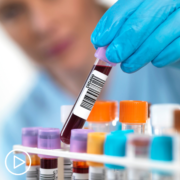How Does Biomarker Testing Impact Metastatic Breast Cancer Treatment Options?
How Does Biomarker Testing Impact Metastatic Breast Cancer Treatment Options? from Patient Empowerment Network on Vimeo.
How are metastatic breast cancer treatment options impacted by biomarker testing results? Dr. Jane Lowe Meisel explains germline testing versus somatic testing – and how results may be used to help determine optimal treatment.
Jane Lowe Meisel, MD is an Associate Professor of Hematology and Medical Oncology at Winship Cancer Institute at Emory University. Learn more about Dr. Meisel here.
See More From INSIST! Metastatic Breast Cancer
Related Resources:

Essential Testing Following a Metastatic Breast Cancer Diagnosis |

|

What Could Metastatic Breast Cancer Genetic Testing Advances Mean for You? |
Transcript:
Katherine:
What is biomarker testing, and how do results impact treatment options?
Dr. Meisel:
Great question. So, I think people often confuse germline mutations and somatic mutations. So, I’ll talk about that a little bit as we talk ab out biomarkers. So, I think biomarkers in general are factors within the tumor that allow us to make treatment decisions. So, if a biomarker in the tumor can predict response to a certain type off treatment, we want to know what that biomarker is so we can better treat the patient and more elegantly design a regimen. So, for example, having an estrogen-positive tumor, estrogen positivity is a biomarker suggestive of response to anti-estrogen treatments, which is why we give anti-estrogen therapy to ER-positive breast cancers.
But more recently, we’ve been able to move a little bit beyond estrogen, HER2 and triple-negative as our subtypes and think a little bit more in some patients about more sophisticated biomarkers. And that’s where somatic mutation testing comes in. So, there are germline mutations, which are inherited mutations that’re present in every cell in your body. So, for example, if your mother was a BRCA mutation carrier and based that BRCA mutation down to you, you would have a germline BRCA mutation. So, your cancer would carry a BRCA mutation, but so would every other cell you have.
And that’s a biomarker. That would make you a candidate for something like a PARP inhibitor. But in cancers, which the genes in the cancer have gone awry by definition, there are often other biomarkers within that tumor that may make you a candidate for certain treatments. And so, those mutations that arise in the cancer itself are called, somatic mutations. Those are mutations in the tumor, can’t be passed down to your offspring or anything like that and were not inherited by your parents. But mutations that’ve accumulated over time as these cancer cells have gone awry.
And so, genomic testing, or biomarker testing can be done often on a metastatic specimen. So, to be specific about it, say you had a metastatic breast cancer to the liver. You could have a liver biopsy done and that tissue from the liver biopsy could be sent for genomic testing. There are a lot of companies that do this and there are also some larger cancer centers that actually do in house testing for genomics. So, this testing can be done and what it does then is, it helps you determine, do you have a biomarker that predisposes you to a certain treatment.
So, if that metastatic liver tissues, for example contained high levels of PBL1 expression for example and you were triple-negative, that would say to your doctor ooh, this is a great candidate for immunotherapy along with chemotherapy. Or if you’re estrogen-positive for example and your tumor contains a mutation in the gene called PIK3CA and that might make you a candidate for a drug called, Alpelisib. So, these mutations could often be paired to a drug or treatment options, or sometimes to a clinical trial to allow patients to come take advantage of more targeted therapies. That sometimes, because they’re targeted, have fewer side effects than drugs that are a little more discriminate.
Katherine:
Marie sent in this question prior to the program, “Are there some genetic tests that’re more accurate than others?”
Dr. Meisel:
That’s a good question. I would say most genetic testing platforms have been heavily vetted and approved by national organizations and laboratories that’ve been tested multiple times before they’re allowed to be marketed. So, I wouldn’t say that one genetic testing program is necessarily better than another. I think that any of the commercially available platforms that’re used are probably pretty accurate.
I was just going to add one thing to that, if that’s okay. I was going to say that I think it’s important when you’re using genetic testing platforms though to know what you’re testing for. So, there are some platforms that will just test for say, the three most common mutations in BRCA1 and BRCA2 that Ashkenazi Jews have.
And so, if you get that testing back and you’re negative, you might think, “Oh, I don’t have a mutation in those genes.” Well, we know from that testing, just as an example, is that you don’t have a mutation in those three alleles of that gene. But if you haven’t had full gene sequencing, you could have a mutation somewhere else in that gene. So, I would say all genetic testing that’s commercially available is probably pretty accurate. But it is important when you get testing done to know what you’re testing for and what you’re not testing for so you can interpret your results accurately. And genetic counselors, as well as your doctors can help you do that.



